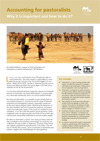Accounting for pastoralists: Why it is important and how to do it?
Ilse Köhler-Rollefson / League for Pastoral Peoples and Endogenous Livestock Development / 2020

Pastoralism is a way of raising animals with nature. It entails the movement of people and herds across landscapes, making use of natural vegetation and crop by-products.
Pastoralism corresponds to public demands for high animal welfare and environmentally friendly methods of livestock production. If we want to make the livestock sector more sustainable, this production system requires strong policy support.
We currently do not know how many pastoralists there are globally or within each country. This is due to the absence of data collection and because pastoralism is not a distinct category in livestock censuses.
Outdated colonial concepts and one-sided focus on the “efficiency” of livestock systems have prevented the recognition of the benefits of pastoralism as a solar-powered, biodiversity-conserving food-production strategy.
In order to monitor the situation and provide a basis for policymaking, FAO should lead a global initiative to define pastoralism and record data by production system.
